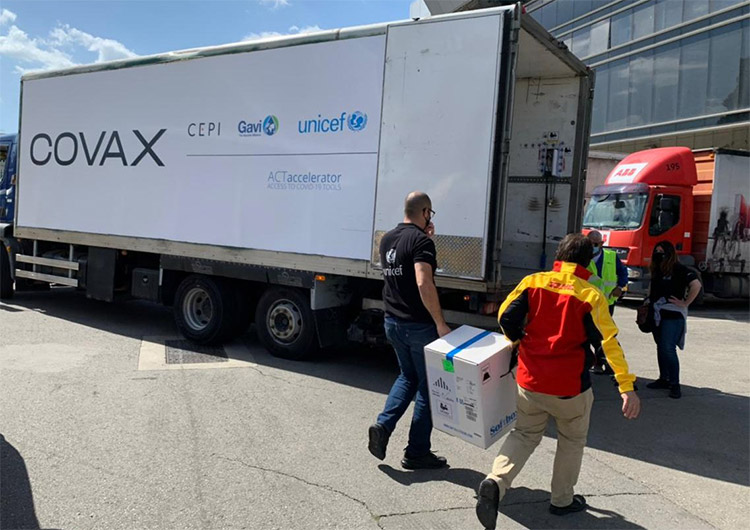
Ramallah and Gaza City, 22 March 2021 – On 17 March, Palestine received the first shipment of 37 440 doses of the Pfizer COVID-19 vaccine and 24 000 doses of the Astra Zeneca COVID-19 vaccine from the COVAX Facility as part of the first wave allocation. These vaccine doses were transferred to the Ministry of Health’s ultra-cold chain and vaccine storage facilities in the West Bank and the Gaza Strip.
Further consignments of COVAX vaccine doses are planned for Palestine to cover 20% of the population – approximately 1 million people. As with the current consignments, these doses are for both the West Bank and the Gaza Strip, according to the prioritization criteria of the national deployment and vaccination plan.
COVAX is a global facility representing partnership between the World Health Organization (WHO), Gavi - the Vaccine Alliance, United Nation’s Children Fund (UNICEF) and the Coalition for Epidemic Preparedness Innovations (CEPI) working on the equitable distribution of COVID-19 vaccines. It includes 190 countries with a total population of more than 7 billion people and ensures fair and equal access to COVID-19 vaccines supplied through UNICEF. WHO and UNICEF are supporting the Government of Palestine’s national vaccination campaign.
Dr Ayadil Saparbekov, acting WHO Head of Office for West Bank and Gaza said: “WHO welcomes the opportunity to be able to help Palestinians fight the coronavirus with this important delivery of vaccines aimed initially at frontline health care workers. People in both the West Bank and Gaza desperately need these vaccines, which is an effective tool in the fight against COVID-19, in addition to the public health measures already in place. We’re proud to play our part in the global COVAX initiative, alongside our partners, as it helps to fill the gaps where vaccines are needed and in short supply. Today’s delivery can give Palestinians a sense of hope that life can return to normal.”
“We have been battling COVID-19 for one year now. These vaccine doses provide us with another tool in fighting the spread of this virus – a critical tool. Nevertheless, it is critical that, alongside the vaccination of the frontline health workers and vulnerable groups, we also continue to reinforce public health measures such as correctly using masks, handwashing, and physical distancing. This vaccine will help return the Gaza Strip and the West Bank closer to normal daily life. Children in Palestine have endured much this last year. It is a privilege for UNICEF to support the Ministry of Health and our partners to ensure equity of vaccine delivery to both the Gaza Strip and the West Bank, starting with health care workers and the most vulnerable groups,” said Lucia Elmi, UNICEF Special Representative to Palestine.
Note to editors
List of donor pledges to the Gavi COVAX AMC is available here.
About COVAX
COVAX, the vaccines pillar of the Access to COVID-19 Tools (ACT) Accelerator, is co-led by the Coalition for Epidemic Preparedness Innovations (CEPI), Gavi, the Vaccine Alliance and the World Health Organization (WHO) – working in partnership with developed and developing country vaccine manufacturers, UNICEF, the World Bank, and others. It is the only global initiative that is working with governments and manufacturers to ensure COVID-19 vaccines are available worldwide to both higher-income and lower-income countries.
About WHO
The World Health Organization provides global leadership in public health within the United Nations system. Founded in 1948, WHO works with 194 Member States, across six regions and from more than 150 offices, to promote health, keep the world safe and serve the vulnerable. Our goal for 2019-2023 is to ensure that a billion more people have universal health coverage, to protect a billion more people from health emergencies, and provide a further billion people with better health and wellbeing.
About UNICEF
UNICEF works in some of the world’s toughest places, to reach the world’s most disadvantaged children. Across 190 countries and territories, we work for every child, everywhere, to build a better world for everyone. For more information about UNICEF and its work for children, visit www.unicef.org. For more information about COVID-19, visit www.unicef.org/coronavirus . Find out more about UNICEF’s work on the COVID-19 vaccines here, or about UNICEF’s work on immunization here.
For more information, please contact:
Nicola Baldwin
WHO- Occupied Palestinian Territory


